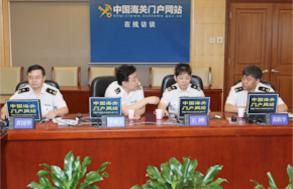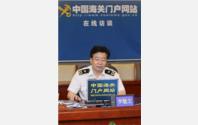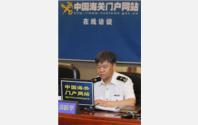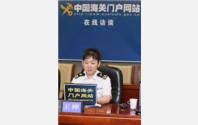 Online Interview
Online Interview
Topic: China Customs 20 Measures to Support Steady Foreign-Trade Growth
Time:10:30 AM (Fri) May 23, 2014
Special Guests:Li Kuiwen, Deputy Director General, GACC Department of Policy Research; Miao Yuexue, Deputy Director General, GACC Department of Customs Control and Inspection; Huang Guohua, Associate Counsel, GACC Department of Statistics
China Customs 20 Measures to Support Steady Foreign-Trade Growth
[Li Kuiwen]: By the so-called single-window mechanism for international trade, we mean that different supervision departments can actually offer services through only one window for international businesses and transport enterprises, and those departments may include customs, inspection and quarantine bureau, maritime bureau, border inspection bureau and port office, etc. In this way, we can improve the efficiency in supervision and lower the costs for clearance. 05/23/2014 11:00:17
[Li Kuiwen]:For your better understanding, I’d like to invite Mr. Miao, our deputy director, to introduce something about Shanghai pilot project. 05/23/2014 11:00:50
[Miao Yuexue]: As for Shanghai pilot project, it is mainly based on the platform of Shanghai E-Port. Through this platform, enterprises can submit formatted documents and electronic information at one time as required by various supervision departments, and then receive feedbacks on the processing status and result of their submission also on this platform. Therefore, multiple departments can offer services on a shared platform, and enterprises no longer need to spend much time, money and labor on going to different departments for approval. That will surely facilitate international trade. 05/23/2014 11:01:29
[Wang Hua]: Thanks for the explanation by our two guests. Mr. Li, among the 20 measures this time, apart from reform, there is also another key phrase: reduce the burden. As we know, currently many foreign trade enterprises are kind of moving forward under various burdens. How to reduce their burdens has been a concern of our government and the public. So what will the Customs work for that? 05/23/2014 11:01:54
[Li Kuiwen]: Indeed, Chinese foreign trade enterprises are facing the increase of all kinds of costs, and that’s a major obstacle for our foreign trade growth. In fact, they hold great anticipation for government’s measures to help relieve their burdens and enhance efficiency. To achieve that goal, the Customs have taken a series of measures including the 6 reform items mentioned just now, and continuously streamlining administrative procedures and delegating powers to lower levels. 05/23/2014 11:02:21
[Li Kuiwen]: Last year, we removed and handed down the approving power of 7 administrative items; on that basis, this year we are going to exempt another 5 items from government approval. Meanwhile, we will strictly restrict the number of newly-established items for administrative approval and remove those items not requiring approval. In a word, we will further streamline internal formalities for customs approval and cancel or simplify our working procedures; it’s our goal to realize effective control with fewer burdens and simplify formalities to facilitate foreign trade. 05/23/2014 11:02:46
[Wang Hua]: Earlier this year, we made a special online interview about the cancellation and decentralization of 7 items subject to administrative approval last year. We didn’t expect that the second round is coming so soon. 05/23/2014 11:03:16
[Li Kuiwen]: That’s true. The Customs have taken forceful measures to cancel and decentralize some administrative approvals. In the past, we had 21 items subject to administrative approval in total. After our efforts last year and this year, only 9 of them are retained, less than half of the original number. 05/23/2014 11:04:44
[Li Kuiwen]: These measures have helped the development of relevant enterprises and industries. For example, after administrative approval for the qualification of customs declarers was canceled last year, the original threshold for applying for this job is removed, and this will provide much room for job hunting and starting business. This year, we are about to cancel the administrative approval for temporary import and export. That will greatly promote the development of producer service industry including R&D, testing, and exhibition and the development of cultural and creative industry. All those industries are targets under government support. 05/23/2014 11:05:31
[Wang Hua]: Just now you mentioned another measure, namely to cut down operation costs of enterprises by optimizing tax levy and management. Can you give us more details? 05/23/2014 11:06:09
Quick Links









